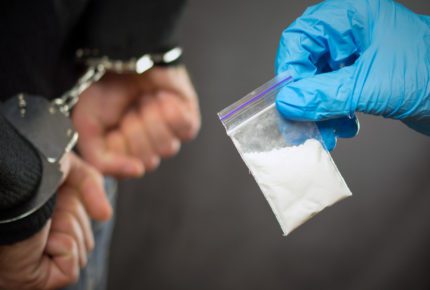

Importing drugs into the UK is a very serious offence, punishable by a maximum term of life imprisonment or a series of other sanctions such as fines and shorter prison sentences for lesser offences. If you or someone you care about has been charged with or is facing prosecution for the importation of drugs into the UK, getting legal advice is essential. In this article, we outline the offence of importation of drugs, give some examples of how this offence is committed, outline sentencing, and discuss whether first time offenders are likely to receive a term of imprisonment for their first offence. Information on where to get more help is also included.
What is the offence of importation of drugs in the UK?
In UK law, importation means the illegal importation or exportation of a controlled drug – it covers both directions of drug movement into and out of the UK. Section 3 of the Misuse of Drugs Act 1971 prohibits the importation of controlled drugs into the UK without a licence. A controlled drug is any substance listed in Schedules 1 to 5 of the Act, and includes illegal drugs such as cocaine, heroin, cannabis, and MDMA.
There are two exceptions to this rule under Section 3:
- Exception (a) allows for the importation and exportation of controlled drugs that have been excepted from the prohibition by regulations made under section 7 of the Misuse of Drugs Act 1971. For example, regulations may be made to allow the importation of controlled drugs for medical or scientific purposes.
- Exception (b) allows for the importation and exportation of controlled drugs under and in accordance with a licence issued by the Secretary of State. Licences are typically issued for medical or scientific purposes, but may also be issued for other purposes, such as for the importation of controlled drugs for use in law enforcement operations.
What are some examples of importation of drugs offences in the UK?
Here are some examples of importation of drugs offences in the UK:
- Smuggling drugs into the UK in luggage or personal belongings
- Importing drugs through the mail or courier services
- Receiving drugs from abroad that have been ordered online
- Being a member of an organised crime group that imports drugs
- Importing drugs for the purpose of selling or supplying them
- Importing drugs for personal use
What happens if you are suspected of committing importation of drugs in the UK?
If you are suspected of committing importation of drugs in the UK, it is a serious criminal offence, and you are likely to face legal consequences. The specific steps and consequences can vary depending on the circumstances of the case and the type and quantity of drugs involved. Here are the typical steps that may follow if you are suspected of drug importation in the UK:
- Investigation: The police and law enforcement agencies will conduct an investigation into the suspected drug importation. This may include surveillance, gathering evidence, and conducting interviews.
- Arrest: If there is sufficient evidence and reasonable grounds to suspect your involvement, you may be arrested by the police. You will be informed of the reasons for your arrest and your rights.
- Questioning: You may be questioned by the police. Ensure you are aware of your right to remain silent and to have legal representation during questioning.
- Charges: If the investigation yields enough evidence, you may be charged with drug importation. These charges will be formally presented, and you will receive a charge sheet outlining the allegations against you.
- Court Proceedings: You will have to appear in court, where you can enter a plea of guilty or not guilty. If you plead not guilty, a trial will be scheduled.
- Trial: The offence of importation of drugs is an indictable offence, meaning your trial will take place in a Crown Court, and the prosecution will present evidence against you. You and your legal representation will have the opportunity to present a defence. If found guilty, you will be sentenced.
- Sentencing: The penalties for drug importation can be severe and depend on various factors, including the type and quantity of drugs involved. Penalties may include imprisonment, fines, or both.
- Confiscation Orders: In some cases, the court may issue a confiscation order, requiring you to forfeit any assets or profits gained from drug importation.
Demonstrably, drug importation is a grave offence in the UK and the penalties are substantial. For this reason, it is highly advisable to seek the advice of an experienced drugs defence solicitor if you find yourself in such a situation.
What is the sentence for an offence involving the importation of drugs?
The sentence for an offence involving the importation of drugs under section 3 of the Misuse of Drugs Act 1971 will depend on a number of factors, including the class and quantity of drugs imported, the offender’s role in the offence, and any previous convictions. The maximum sentence that the court can impose is life imprisonment.
The Sentencing Council has issued definitive guidelines on drug importation offences, which provide judges with a framework for imposing sentences. The guidelines divide drug importation offences into three categories:
- Category 1: This category covers the most serious offences, such as the importation of large quantities of Class A drugs or the importation of any drugs by an organised crime group.
- Category 2: This category covers less serious offences, such as the importation of smaller quantities of Class A drugs or the importation of Class B or C drugs.
- Category 3: This category covers the least serious offences, such as the importation of very small quantities of Class B or C drugs for personal use.
The guidelines also set out a starting point sentence for each category of offence. This is the sentence that the judge will start with when deciding what sentence to impose. Starting points for all offence categories are fines. The judge will then consider a number of aggravating and mitigating factors before adjusting the sentence up or down from the starting point.
Some aggravating factors that the judge may consider include:
- The class and quantity of drugs imported
- The offender’s role in the offence
- Whether the offender has any previous convictions
- Whether the offence was committed in a commercial context
- Whether the offender was motivated by greed or financial gain
Some mitigating factors that the judge may consider include:
- The offender’s age and mental health
- The offender’s remorse and cooperation with the authorities
- The offender’s personal circumstances, such as whether they have dependents
In addition to the aggravating and mitigating factors, the judge will also consider the overarching principles of sentencing, such as deterrence, punishment, rehabilitation, and protection of the public. Once the judge has considered all of the relevant factors, they will impose a sentence that they believe is proportionate to the offence and the offender.
Will I go to prison if it is my first time committing an offence involving the importation of drugs?
Whether or not someone will go to prison for a first-time offence involving the importation of drugs will depend on a number of factors, including the class and quantity of drugs imported, the offender’s role in the offence, and any previous convictions.
In general, first-time offenders who import small quantities of drugs for personal use are less likely to go to prison than first-time offenders who import large quantities of drugs for commercial purposes.
The Sentencing Council guidelines for drug offences recommend that first-time offenders who import small quantities of drugs for personal use be given a community order or a suspended sentence. However, the judge may still decide to impose a prison sentence, even for a first-time offender.
For example, a first-time offender who imports a small quantity of cannabis for personal use is unlikely to go to prison. However, a first-time offender who imports a small quantity of cocaine for personal use may be more likely to go to prison, especially if the cocaine is of high purity.
The likelihood of going to prison for a first-time offence involving the importation of drugs is also increased if the offender has any previous convictions, even if they are not for drug offences. A first-time offender who imports a small quantity of cocaine for personal use, for example, is more likely to go to prison if they have a previous conviction for violence.
In summary, the likelihood of going to prison for a first-time offence involving the importation of drugs will vary depending on the specific circumstances of the case. The best way to assess whether your particular circumstances will lead to a prison sentence is to get in touch with an experienced criminal defence solicitor with a proven record on drugs crimes.
Where to get further help
If you or someone you care about is concerned about potential legal consequences for the importation of drugs, it is imperative that you seek sound and reliable legal advice. The team at Stuart Miller Solicitors have been advising clients on drugs offences for decades and are standing by ready to take your case. For a free consultation, get in touch with the team today.
OUR COMMITMENTS TO YOU:
-
Responsive
A legal expert will consult you within 24 hours of making an enquiry.
-
Empathetic
We will always treat you with trust, understanding and respect.
-
Specialised
Your case will be handled by an expert who specialises in your type of offence.
-
Proactive
We will take early action to end proceedings as soon as it is practically and legally possible to do so.
-
Engaged
You will be kept updated on your case at all times. We will provide a named contact available to answer your questions.
-
Caring
We understand this is a difficult and stressful time for you and your family. Our team will support you every step of the way.
-
Tenacious
We will never give up on your case. We fight tirelessly to get you the best possible outcome.

